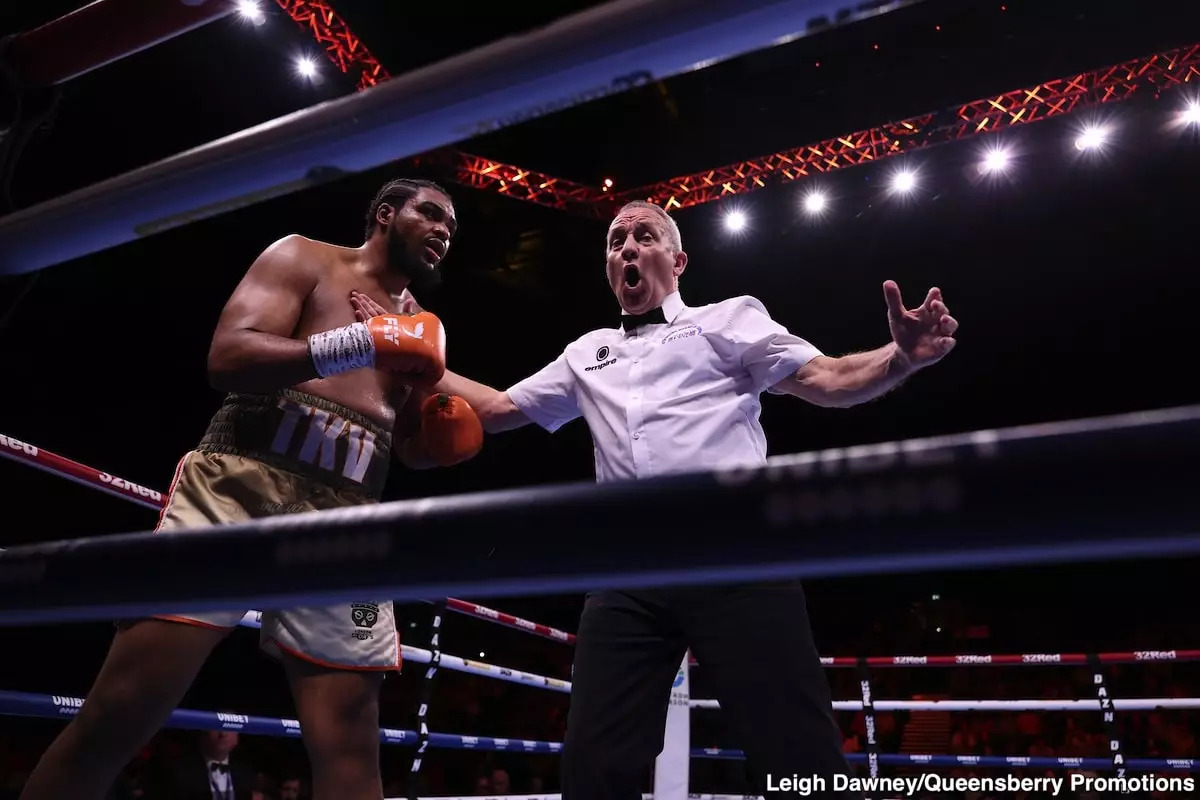Boxing, often touted as the “sweet science,” has a reputation for thrilling matches filled with skill, strategy, and sometimes, downright chaos. The recent bout in Manchester featuring Filip Hrgovic’s victory over Joe Joyce certainly encapsulated that essence, yet it was the British heavyweight title fight between David Adeleye and Jeamie TKV that stole the spotlight for a far more controversial reason. With stakes magnified by the fact that the heavyweight title was vacant, the culmination of the evening was far from what fans expected when it morphed into a debate over referee Ron Kearney’s decisions.
Much of the drama unfolded in the sixth round when Kearney attempted to separate the two fighters engaged in a clinch. Just as TKV complied with Kearney’s instructions to break, Adeleye unleashed a fierce left hook that connected with TKV’s chin, sending him to the canvas. Replays clearly illustrate the pivotal moment: Kearney had signaled twice for a break and, in what can only be described as an unorthodox series of actions, tapped TKV on the glove just moments before the punch was thrown. The ensuing fallout left the boxing community buzzing and questions of ethics swirling around the sport.
The Outcry from the Promoter
Ben Shalom, TKV’s promoter, didn’t hold back in expressing his frustration. His words echo the sentiments that many fans shared, capturing the essence of the moment’s absurdity. “What I’ve just witnessed was one of the most disgraceful things I’ve seen in my career,” he declared, encapsulating the incredulity surrounding Kearney’s performance that night. His condemnation of the referee’s actions highlights a growing concern regarding officiating in boxing, suggesting that the integrity of the sport is merely a delicate veneer masking the chaotic reality underneath.
It’s important to dissect the heart of Shalom’s argument: the confusion caused by the referee’s decisions. There’s a fundamental expectation that referees maintain a level of clarity in their instructions, allowing fighters to operate within a framework that minimizes misunderstandings. In this case, Kearney’s actions led to a scenario that could be characterized as a ‘cheap shot,’ inflicting not only physical damage but also emotional and psychological scars on TKV.
What Happens Next? A Potential Appeal
Caught in this crossfire is the British Boxing Board of Control, who now face the task of addressing Shalom’s intention to appeal the result. Historically, appeals in boxing often lead to dead ends, dragging on with little to no resolution. The efficacy with which they handle this incident will speak volumes about their commitment to standards in officiating. Will their actions set a precedent, or will this case be another footnote in the annals of boxing history, where grievances disappear into obscurity?
The challenge lies not just in reversing the result, but in fostering a culture of accountability within the sport. Boxing continues to evolve, yet such blunders serve as a stark reminder of the sport’s imperfections that need addressing as it navigates modernity. The integrity of a match, particularly in cases where a title is at stake, must be unanimously upheld, and it’s on the governing bodies to ensure that their referees are trained and prepared to handle high-pressure situations effectively.
The Implications for a Rematch
Despite the heated discussions surrounding the incident, one question remains: Should there be a rematch between Adeleye and TKV? While many anticipated a gripping contest, the initial fight turned out to be somewhat lackluster until the controversial conclusion. Revisiting this match could open old wounds or spark renewed interest, but only time will tell if audiences would be drawn back to the canvas.
Moreover, TKV deserves some form of recompense for the tumult he experienced. The notion that he was on the cusp of victory before being dealt such a harsh blow by the referee’s missteps raises questions about fairness and the true spirit of competitive sport. Should he not receive a chance to reclaim his rightful standing, the boxing community might question the legitimacy of the matchup altogether.
The ramifications of Kearney’s momentary lapse extend beyond the ring and delve into a philosophical discussion about accountability and responsibility in sports. As fans and stakeholders await further developments, the incident serves as a potent reminder that in boxing, things can change in a heartbeat—often with devastating consequences.


Leave a Reply